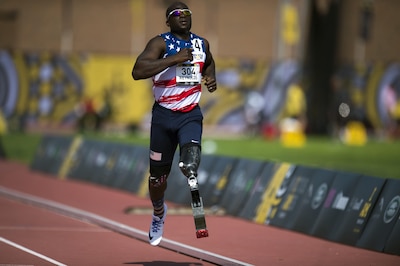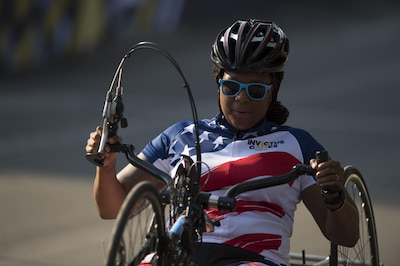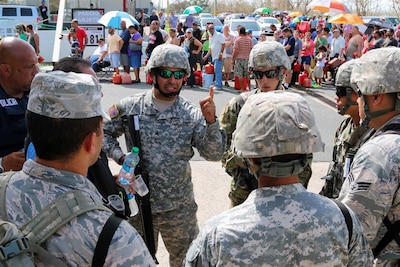By Shannon Collins DoD News, Defense Media Activity
TORONTO, Sept. 30, 2017 — As medically retired Army Capt.
Will Reynolds added bronze medals in the men’s 1,500-meter track and field and
rugby competitions in his disability category to his extensive medal collection
from the Department of Defense Warrior Games and events like the 2017 Invictus
Games here, he said he couldn’t have done it without his family.
“Our families are with us at our lowest points when we were
wounded, ill and injured and then this is a really high point, so Invictus is a
way for family members to see competitors like myself healthy again and
excelling. It’s a pinnacle for our recovery and kind of a reward for the
families sticking it out through the hard days, those sleepless nights in the
hospital and for all those hard times,” Reynolds said. “This is a good
celebration for them, too, going to the opening and closing ceremonies,
attending the concerts -- it’s just unbelievable.”
The Invictus Games, established by Prince Harry in 2014, brings
together wounded and injured veterans from 17 nations for 12 adaptive sporting
events, including track and field, wheelchair basketball, wheelchair rugby,
swimming, sitting volleyball, and new to the 2017 games, golf.
‘We Feel Honored’
Reynolds’ wife, Cassandra, said she’s proud of her husband.
“We feel honored to be a part of these games,” she said. “It’s great to be able
to participate with our whole family. Having families and caregivers here is
critical because these guys are tough physically but the mental and emotional
support your family is able to provide for you and just the constant, to have
that network and constant, that’s really helpful.”
Will’s son, Malachi, 8, enjoys watching his dad compete. “My
daddy’s awesome because he rides bikes and runs with me and plays with me,”
Malachi said. “He’s the coolest. I love that he’s in the Invictus Games.”
Malachi and one of his sisters, Gabrielle, 6, both play
rugby and enjoy watching their father compete in wheelchair rugby.
“I like watching him play rugby the most,” Gabrielle said.
Recovery
Reynolds served in the Army for six years as an infantry
officer and rifle platoon leader. In 2004, while performing a dismounted patrol
during a reconnaissance mission in southwest Baghdad in Iraq, he was injured
when a remotely detonated improvised explosive devise went off.
He underwent 26 surgeries from November 2004 to December
2006 as the doctors tried to save his left leg. Eventually, his leg had to be
amputated at the knee.
“When his mother first saw him, it was hard to internalize
where he would be years later,” Cassandra said. “At that point, it seemed like
he was going to be bed ridden for an indefinite amount of time, and he needed
help with everything: eating, going to the bathroom, everything. The doctors
were pretty uncertain in terms of what his ability would be to walk normally,
let alone run. To see where he’s come, where he’s started from and where he’s
come to now, it’s just been incredible. With the right kind of support and
therapy, he was able to do all the things he wanted to do essentially.”
Reynolds’ wife said Malachi was interested in how his
father’s prosthetics worked.
“He likes to help daddy put it on, so he had to be part of
the process,” Cassandra said. “He would go get the leg for him or charge it.”
Reynolds said having his family interested in his therapy
and recovery process and wanting to get back to his children, Malachi,
Gabrielle, Genevieve and Evangeline, were the motivating factors to accelerate
his recovery.
Sharon Greenhill is the mother of one of Reynolds’ best
friends, former Army Capt. Dustin Greenhill, who served two tours in Iraq and
is now an orthopedic surgeon. They both went to the U.S. Military Academy
together and were on the gymnastics team. When Will went through the limb
salvage decision process, he reached out to his friend. Sharon has been
watching Will compete through the years.
“It’s always wonderful to watch Will compete and be
successful,” she said. “It was a long road from the time he was injured until
the time he decided it was time to let go of the leg. I remember my son telling
him that his quality of life will actually be better and discussing that. It’s
been a hard road for Will, going through the pain of the injury and the
rehabilitation. I remember when Will was first able to go with my son to learn
how to ski on the mono ski.”
She said Reynolds has been training since the minute he was
able to get back on his feet. “He’s not only a world-class athlete; he’s a
world-class person,” she said. “He’s an amazing human being. He’s achieved so
much, academically and emotionally. He’s just a pleasure to watch develop. He
was determined to not let it stop him, and it hasn’t.”
Reynolds has competed in national and international events
and hopes to make the Paralympics cycling team in 2020.
Toronto
Reynolds’ mother, Evelyn, said she is excited to watch her
son compete in Toronto. “It’s like my backyard because even as Will was growing
up, we were in Toronto all the time,” she said. “We have very close friends who
grew up with us who live here. We’ve participated in everything from
engagements to weddings, so we’re very close. We love Toronto.”
Evelyn, who lives in Rochester, New York, said the Canadian
community has been very hospitable. “You can’t expect better with
accommodations,” she said.
“The Canadians have been very hospitable,” Cassandra said.
“We’re their neighbors, and they’re our brothers in arms. We’ve had nothing but
great support and help from everyone here at the games.”
Reynolds said he has enjoyed how the hotel has blocked off a
couple of its floors for the athlete village for all of the competitors from
all of the countries.
“The hotel has just been amazing; it’s one of the best
athlete centers we’ve had,” he said. “It’s pretty cool; you go to the
convenience story and you’re in a U.S. kit and people know what you’re here
for. There’re banners in the city. It’s always great when you come to these big
areas and there’s a lot of stuff going on but people still realize that this is
an important event, too. It was like that in London, too. It’s pretty awesome
to be in such a big city and people are still getting behind the event.”
Reynolds said he regularly signs autographs and photos
during the DoD Warrior Games and Invictus Games.
“It happens a lot at the events, which is pretty surreal,”
he said. “I don’t see myself as anybody to be giving an autograph. I’ve
probably given five or six today. People bring their kids out here, pulling
them out of school to support us and get them motivated by some of these great
athletes so it’s kind of cool.”
Cassandra said the best part of having the competitors and
families all at the same hotel is the camaraderie. “We’re listening to each
other’s music, and we’re dancing and celebrating,” she said. “Even though we
may not speak the same language, just through visual and body cues, we can tell
we’re all here fighting the same battles and supporting each other.”
Hug a Vet
Cassandra said she hopes events like the Invictus Games will
spread awareness that there’s a wounded population out there.
“There are veterans who have served their country, and
they’re assimilating back into their daily lives and their community. They
would love your support, be it watching them compete or just thanking them.
Just hug a vet,” she said.










